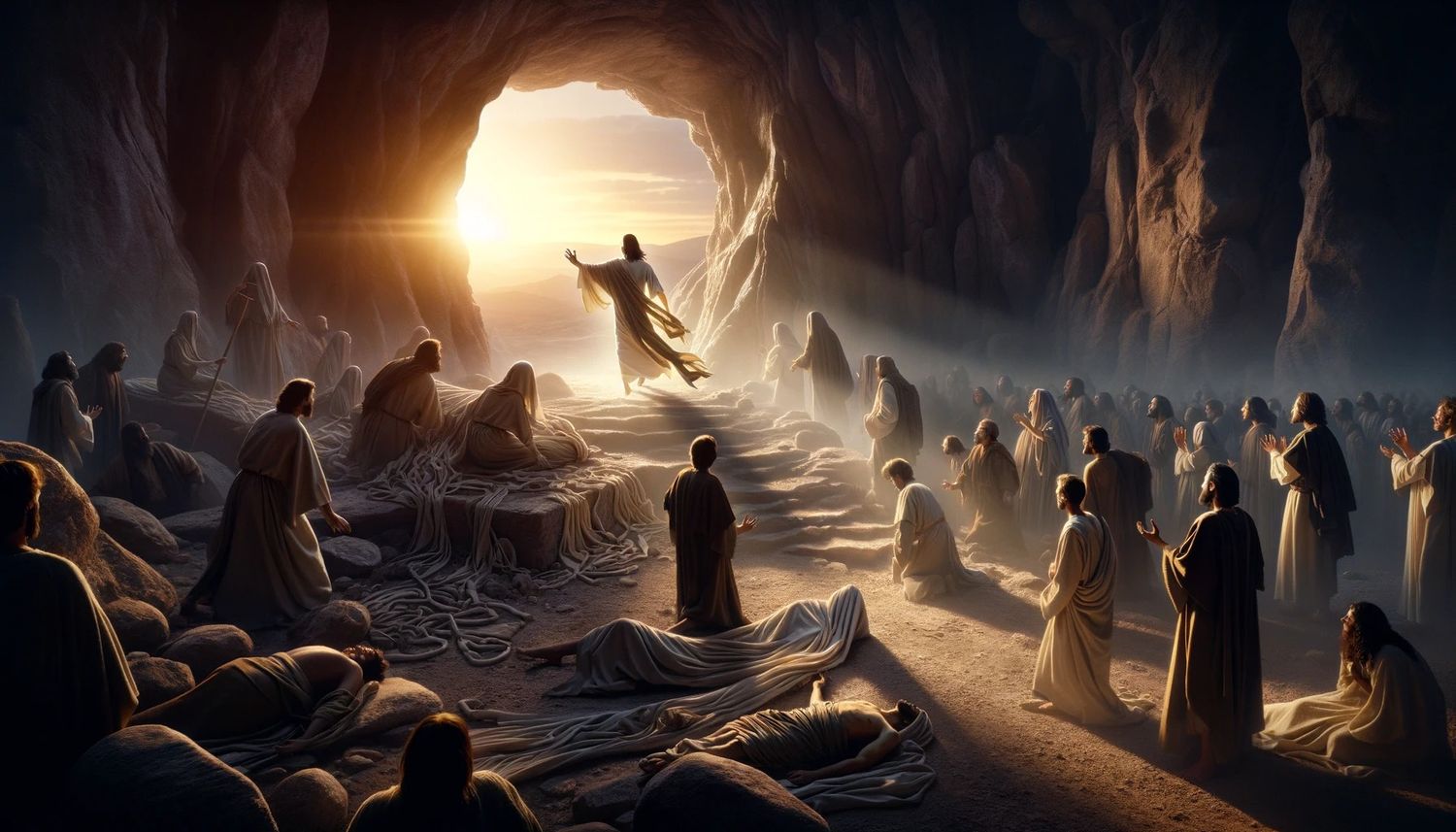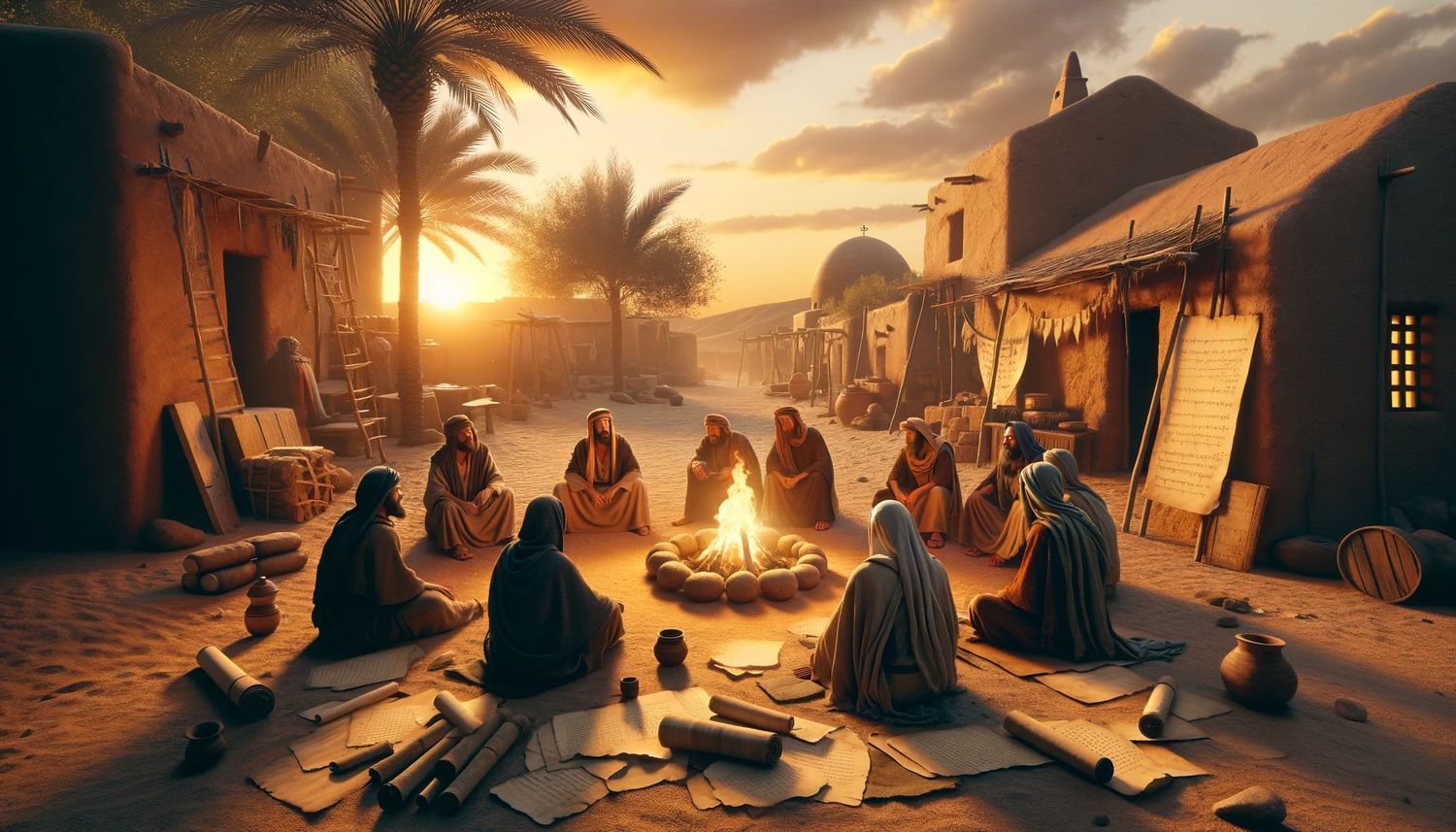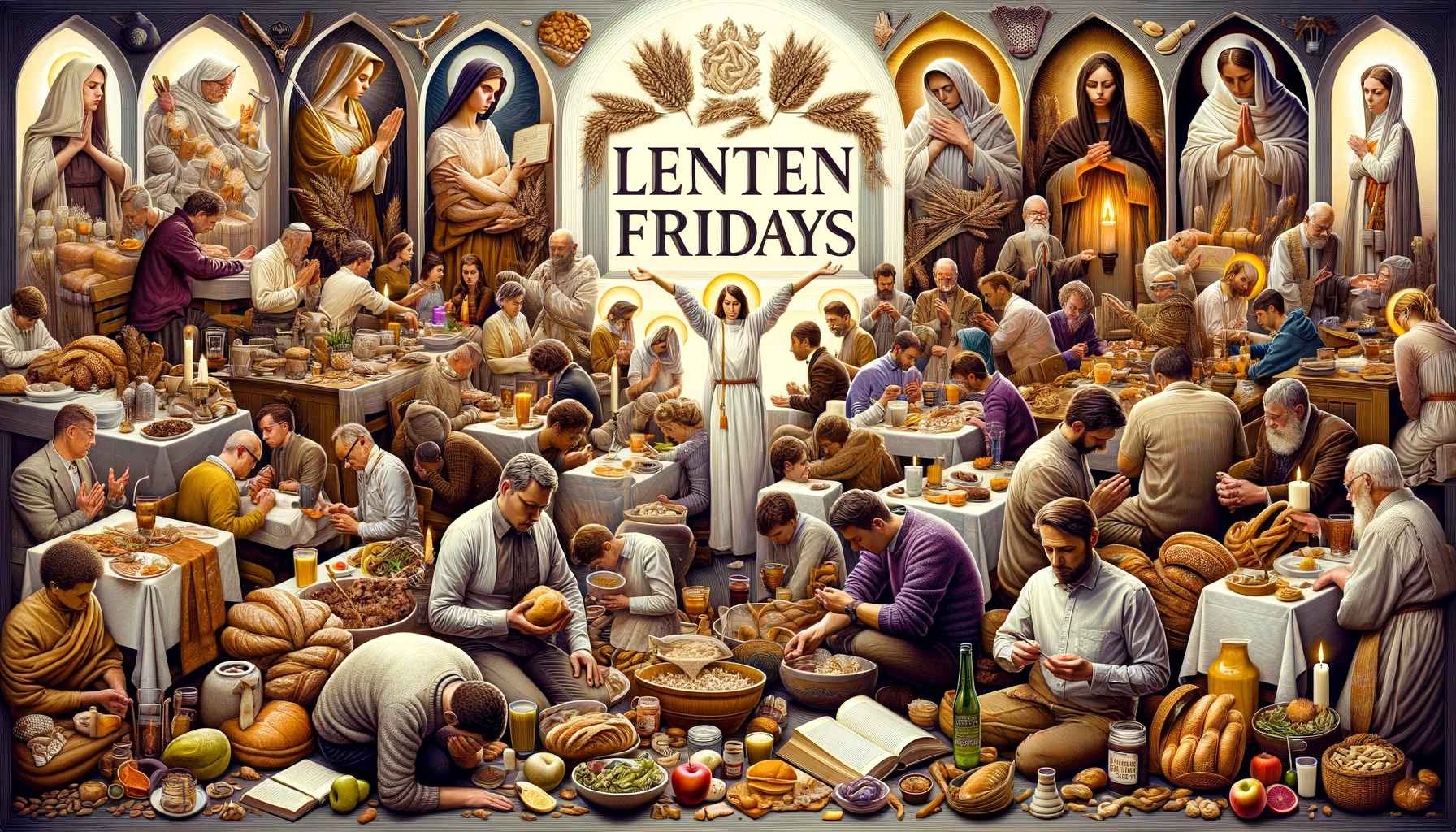Home>Christian Videos>Bible Stories>How Many Parables Are In The Gospels


Bible Stories
How Many Parables Are In The Gospels
Published: March 7, 2024
Jason DeRose, Managing Editor at Christian.net, uses his expertise in religion and journalism to deepen understanding of faith's societal impacts. His editorial leadership, coupled with a strong academic background, enriches the platform’s diverse content, earning him recognition in both journalism and religious circles.
Discover the fascinating world of Bible stories with a deep dive into the parables found in the Gospels. Explore the rich teachings and timeless wisdom within these powerful narratives. Unlock the spiritual insights and lessons they hold for modern life.
(Many of the links in this article redirect to a specific reviewed product. Your purchase of these products through affiliate links helps to generate commission for Christian.net, at no extra cost. Learn more)
Table of Contents
Introduction
How many parables are in the Gospels? This is a question that has intrigued many scholars and believers alike. The parables in the Gospels are an essential part of Jesus' teachings, and they offer valuable lessons and insights into the kingdom of God. In this article, we will explore the significance of parables in the Gospels and delve into some of the most well-known parables, shedding light on their meanings and relevance to our lives today. So, let's embark on this enlightening journey through the parables of the Gospels.
Read more: Parable Of The Sower: In Which Gospels?
Understanding Parables in the Gospels
Parables are a unique form of storytelling that Jesus frequently used in his teachings. These stories are designed to convey spiritual truths and moral lessons in a way that is relatable and easily understandable to the listeners. The parables in the Gospels serve as powerful tools for conveying profound messages about the kingdom of God, the nature of faith, and the ethical principles that should govern the lives of believers. They often employ familiar, everyday scenarios to illustrate deeper spiritual realities, making them accessible to people from all walks of life.
The use of parables allowed Jesus to engage his audience in a thought-provoking manner, prompting them to reflect on the deeper meanings behind the stories. By presenting these allegorical narratives, Jesus challenged his listeners to consider the implications of his teachings and encouraged them to examine their own attitudes and actions. The parables in the Gospels continue to captivate and inspire readers today, inviting them to ponder the timeless wisdom encapsulated within these narratives.
As we delve into the various parables found in the Gospels, it is important to approach them with an open heart and a willingness to uncover the profound truths they contain. Each parable offers a unique perspective on the nature of God's kingdom and provides valuable insights into the qualities of discipleship and righteous living. Through the exploration of these parables, we can gain a deeper understanding of Jesus' teachings and their relevance to our lives in the present day.
The Parable of the Sower
The Parable of the Sower, found in the Gospel of Matthew, Mark, and Luke, is one of the most well-known and impactful parables shared by Jesus. In this parable, Jesus uses the metaphor of a sower scattering seeds on different types of soil to illustrate the varying responses to the message of the kingdom of God. The seeds that fall on the path are devoured by birds, representing those who hear the word but do not understand it. The seeds that fall on rocky ground wither away, symbolizing those who receive the word with joy but have no root and fall away when faced with tribulation. The seeds that fall among thorns are choked, signifying those who hear the word but are consumed by the cares and riches of the world. Finally, the seeds that fall on good soil yield a bountiful harvest, representing those who hear, understand, and bear fruit, demonstrating the receptive and fertile hearts of true disciples.
This parable serves as a profound lesson about the receptivity of the human heart to the message of the kingdom. It highlights the importance of cultivating a receptive and open heart to receive and internalize the teachings of Jesus. The different types of soil represent the varying responses and attitudes of people towards the gospel, emphasizing the need for spiritual readiness and discernment. The Parable of the Sower challenges believers to examine the condition of their hearts and strive to be like the good soil, yielding a fruitful harvest of righteousness and faith.
The enduring relevance of the Parable of the Sower lies in its timeless message about the transformative power of the word of God and the significance of spiritual receptivity. It encourages believers to reflect on their own receptiveness to the teachings of Jesus and to cultivate a heart that is receptive, responsive, and steadfast in faith. This parable serves as a call to action, urging individuals to nurture a receptive heart that is capable of bearing the fruits of faith, love, and obedience. The Parable of the Sower continues to inspire and challenge believers to embrace the transformative message of the gospel and to live lives that reflect the fertile soil, yielding an abundant harvest of spiritual growth and discipleship.
The Parable of the Prodigal Son
The Parable of the Prodigal Son, recounted in the Gospel of Luke, is a poignant and timeless narrative that resonates with profound themes of forgiveness, redemption, and the boundless love of God. The parable revolves around a father and his two sons, one of whom demands his share of the inheritance and squanders it in reckless living, only to find himself destitute and longing for the comfort of his father's home. As he returns, broken and repentant, the father's compassionate and joyous reception of his wayward son stands as a powerful symbol of divine mercy and unconditional love.
This parable encapsulates the essence of God's forgiveness and the transformative power of reconciliation. It serves as a compelling portrayal of the Father's unwavering love and readiness to embrace those who seek repentance. The Prodigal Son's journey from rebellion to contrition and restoration reflects the universal human experience of sin, remorse, and the yearning for restoration. The father's response to his son's return exemplifies the boundless grace and compassion of God, offering hope and encouragement to all who seek reconciliation and renewal.
The Parable of the Prodigal Son also sheds light on the destructive nature of pride and the liberating humility of repentance. The Prodigal Son's realization of his folly and his decision to return to his father's house demonstrate the transformative power of humility and the willingness to seek forgiveness. The parable challenges believers to examine their own attitudes towards repentance and forgiveness, emphasizing the liberating and transformative nature of genuine contrition and reconciliation.
Furthermore, the parable introduces the character of the elder son, who struggles with resentment and jealousy upon witnessing his father's warm reception of his wayward sibling. This aspect of the parable serves as a reminder of the human tendency towards self-righteousness and the need to cultivate a spirit of compassion and forgiveness towards others. The elder son's journey towards understanding and forgiveness mirrors the ongoing struggle of humanity to embrace the virtues of empathy and grace.
The enduring relevance of the Parable of the Prodigal Son lies in its profound portrayal of divine love, forgiveness, and the transformative power of repentance. It continues to resonate with believers, offering a timeless message of hope, restoration, and the boundless mercy of God. This parable serves as a powerful reminder of the Father's unchanging love for His children and the invitation to all to seek reconciliation and renewal through genuine repentance and humility.
The Parable of the Good Samaritan
The Parable of the Good Samaritan, found in the Gospel of Luke, is a compelling narrative that delves into the essence of compassion, empathy, and the universal call to love one's neighbor. The parable unfolds with a lawyer testing Jesus by asking, "Who is my neighbor?" In response, Jesus shares the story of a man who falls victim to robbers and is left wounded on the road. Both a priest and a Levite pass by the injured man without offering assistance, but a Samaritan, traditionally viewed as a social outcast, goes out of his way to tend to the wounded man's needs, demonstrating profound compassion and care.
This parable challenges societal norms and prejudices, emphasizing the transformative power of compassion and the universal call to love and care for others, regardless of social, ethnic, or religious differences. The Samaritan's selfless actions serve as a powerful example of genuine neighborly love, transcending cultural barriers and societal divisions. The Parable of the Good Samaritan calls believers to embody the spirit of compassion and empathy, extending care and support to those in need, irrespective of societal labels or prejudices.
Furthermore, the parable confronts the notion of religious piety and challenges individuals to prioritize acts of compassion and mercy over religious formalities. The priest and the Levite, who symbolize religious authority and adherence to ritualistic practices, choose to bypass the wounded man, highlighting the contrast between religious orthodoxy and the practical expression of love and compassion. This aspect of the parable underscores the significance of genuine, selfless acts of kindness and the ethical imperative to prioritize the well-being of others above religious formalities.
The enduring relevance of the Parable of the Good Samaritan lies in its profound message of universal compassion and the call to transcend societal barriers in extending care and support to those in need. It serves as a timeless reminder of the transformative impact of genuine acts of kindness and the ethical imperative to embrace the virtues of empathy and neighborly love. This parable continues to inspire believers to embody the spirit of the Good Samaritan, reaching out to those in distress with compassion, care, and unwavering love, regardless of societal expectations or divisions.
Read more: How Many Verses Are In The Gospels
The Parable of the Mustard Seed
The Parable of the Mustard Seed, as narrated in the Gospels of Matthew, Mark, and Luke, presents a profound illustration of the kingdom of God and the transformative power of faith. In this parable, Jesus compares the kingdom of God to a mustard seed, which is one of the smallest seeds, but when sown, it grows into a large tree, providing shelter for birds. This seemingly insignificant seed, with its remarkable potential for growth, serves as a powerful metaphor for the expansive and transformative nature of God's kingdom.
The mustard seed's remarkable transformation from a tiny seed to a large tree mirrors the transformative impact of faith in the lives of believers. This parable underscores the notion that even the smallest measure of faith has the potential to yield significant and far-reaching outcomes. It emphasizes the intrinsic power of faith to grow, flourish, and impact the lives of individuals and communities, ultimately contributing to the expansion of God's kingdom on earth.
Furthermore, the imagery of the mustard seed growing into a large tree, providing shelter for birds, symbolizes the inclusive and nurturing nature of God's kingdom. The expansive branches of the mustard tree offer refuge and sustenance to the birds, reflecting the inclusive and protective embrace of God's kingdom, which welcomes and provides for all who seek shelter and nourishment. This aspect of the parable highlights the universal and nurturing qualities of God's kingdom, inviting individuals from all walks of life to find solace, support, and spiritual nourishment within its expansive reach.
The enduring relevance of the Parable of the Mustard Seed lies in its profound message of the transformative power of faith and the inclusive nature of God's kingdom. It serves as a timeless reminder of the potential for growth and impact inherent in even the smallest expressions of faith. This parable continues to inspire believers to cultivate and nurture their faith, recognizing its potential to grow, flourish, and contribute to the expansion of God's kingdom, providing shelter and sustenance to all who seek refuge within its inclusive embrace.
The Parable of the Lost Sheep
The Parable of the Lost Sheep, featured in the Gospels of Matthew and Luke, presents a poignant illustration of God's unwavering love and relentless pursuit of those who have strayed. In this parable, Jesus recounts the story of a shepherd who leaves behind ninety-nine sheep to search for the one that has gone astray. The shepherd's relentless quest to find the lost sheep underscores the depth of God's love and concern for each individual, emphasizing the intrinsic value of every soul in the eyes of the divine.
This parable encapsulates the essence of God's compassion and the redemptive nature of His love. The shepherd's unwavering determination to seek out the lost sheep reflects the boundless grace and mercy of God, who tirelessly pursues those who have wandered from His fold. The parable serves as a powerful reminder of the individualized care and concern that God extends to each person, regardless of their circumstances or the extent of their wandering.
Furthermore, the Parable of the Lost Sheep highlights the joy and celebration that accompany the recovery of the lost. Upon finding the lost sheep, the shepherd rejoices and calls together his friends and neighbors to share in his joy. This aspect of the parable underscores the profound delight that permeates the heavens when a single lost soul is restored to the fold, emphasizing the immeasurable value that God places on the redemption and restoration of each individual.
The enduring relevance of the Parable of the Lost Sheep lies in its timeless message of God's relentless pursuit of those who have strayed and His boundless love for every individual. It serves as a compelling portrayal of divine compassion and the redemptive nature of God's love, offering hope and assurance to all who may feel lost or distant from the embrace of the divine shepherd. This parable continues to inspire believers, reminding them of the immeasurable worth that God attributes to each soul and the unyielding love that propels His relentless pursuit of those who have wandered from His care.
The Parable of the Tenants
The Parable of the Tenants, as recounted in the Gospel of Matthew, Mark, and Luke, presents a thought-provoking allegory that delves into the themes of stewardship, accountability, and the rejection of divine authority. In this parable, a landowner plants a vineyard, equips it with all the necessary facilities, and then leases it to tenants before embarking on a journey. When the time comes for the harvest, the landowner sends his servants to collect the produce, only to have them mistreated, beaten, and even killed by the tenants. In a final attempt to claim what is rightfully his, the landowner sends his son, whom the tenants ultimately kill in their audacious pursuit of seizing the inheritance.
This parable serves as a powerful metaphor for the relationship between God and humanity, highlighting the responsibility of individuals to honor and respect the divine authority and the consequences of rejecting God's messengers and ultimately His Son. The vineyard symbolizes the world entrusted to humanity, with the tenants representing the people who have been given the privilege of stewardship over God's creation. The landowner's repeated attempts to collect the harvest through his servants and son reflect God's persistent outreach to humanity, seeking the fruits of righteousness and faithfulness.
Furthermore, the Parable of the Tenants underscores the tragic consequences of rebellion and the rejection of divine authority. The tenants' audacious defiance and eventual murder of the landowner's son serve as a stark portrayal of humanity's propensity to rebel against God's authority and reject His messengers. This aspect of the parable highlights the sobering reality of the human inclination towards pride, disobedience, and the rejection of God's rightful claim over His creation.
The enduring relevance of the Parable of the Tenants lies in its profound message of stewardship, accountability, and the consequences of rejecting divine authority. It serves as a timeless reminder of the responsibility entrusted to humanity to honor God's authority and faithfully steward His creation. This parable continues to challenge believers to reflect on their attitudes towards divine authority and to embrace their role as faithful stewards, yielding the fruits of righteousness and obedience in response to God's persistent call.
The Parable of the Wedding Feast
The Parable of the Wedding Feast, found in the Gospel of Matthew, presents a compelling narrative that delves into the themes of invitation, rejection, and the inclusive nature of God's kingdom. In this parable, Jesus shares the story of a king who prepares a grand wedding feast for his son and sends out invitations to the guests. However, those who are invited refuse to attend, offering various excuses and even mistreating the king's messengers. In response to their rejection, the king extends the invitation to others, including both the good and the bad, filling the wedding hall with guests.
This parable serves as a powerful illustration of the inclusive and indiscriminate nature of God's invitation to partake in the blessings of His kingdom. The initial rejection by the invited guests reflects the resistance and indifference that can characterize human responses to God's gracious invitation. The king's subsequent extension of the invitation to a diverse range of individuals underscores the universal call to partake in the joy and abundance of God's kingdom, transcending social status, background, or merit.
Furthermore, the Parable of the Wedding Feast highlights the consequences of rejecting the divine invitation and the significance of responding with humility and gratitude. The initial guests' refusal to attend the feast results in their exclusion, while the new guests, who respond with openness and appreciation, are welcomed into the celebration. This aspect of the parable emphasizes the transformative power of a receptive and humble heart, which recognizes and embraces the invitation to partake in the blessings of God's kingdom.
The enduring relevance of the Parable of the Wedding Feast lies in its profound message of inclusivity, humility, and the transformative power of God's invitation. It serves as a timeless reminder of the universal call to embrace the blessings of God's kingdom with gratitude and openness, transcending barriers and preconceptions. This parable continues to inspire believers to respond to God's invitation with humility and receptivity, recognizing the immeasurable grace and abundance that await those who accept the divine call to partake in the joyous celebration of His kingdom.
Read more: How Many Gospels Are In The Bible
The Parable of the Rich Fool
The Parable of the Rich Fool, as depicted in the Gospel of Luke, unfolds as a cautionary tale that delves into the perils of greed, materialism, and the fleeting nature of worldly possessions. In this parable, Jesus shares the story of a wealthy man whose land yields an abundant harvest, prompting him to contemplate building larger storage facilities to hoard his surplus crops. The rich man, consumed by his desire for personal gain and security, resolves to indulge in a life of leisure and self-indulgence, oblivious to the impending reality of his mortality.
This parable serves as a poignant reminder of the inherent dangers of prioritizing material wealth and temporal pursuits over spiritual enrichment and the well-being of others. The rich man's fixation on accumulating and safeguarding his possessions reflects the allure of materialism and the deceptive promise of security that wealth can offer. His self-centered approach to abundance stands in stark contrast to the values of generosity, stewardship, and compassionate concern for others that are espoused in the teachings of Jesus.
Furthermore, the Parable of the Rich Fool underscores the futility of placing one's ultimate trust and fulfillment in earthly treasures. The rich man's assumption of prolonged life and uninterrupted enjoyment of his amassed wealth is shattered by the abrupt revelation of his mortality. His misplaced confidence in the permanence of his possessions serves as a sobering reminder of the transient nature of worldly riches and the imperative to prioritize the pursuit of spiritual treasures that endure beyond the confines of earthly existence.
The enduring relevance of the Parable of the Rich Fool lies in its timeless message of the dangers of greed, the pursuit of material wealth, and the neglect of spiritual priorities. It serves as a compelling admonition to believers, urging them to cultivate a perspective that transcends the allure of material possessions and to prioritize the pursuit of spiritual virtues, such as generosity, humility, and compassionate stewardship. This parable continues to challenge individuals to reevaluate their attitudes towards wealth and possessions, recognizing the imperative to invest in the eternal treasures of faith, righteousness, and selfless service, rather than succumbing to the fleeting allure of worldly riches.
Conclusion
In conclusion, the parables found in the Gospels are invaluable sources of spiritual wisdom and ethical guidance, offering profound insights into the nature of God's kingdom and the principles of righteous living. Each parable serves as a rich tapestry of allegorical narratives, inviting readers to contemplate the timeless truths encapsulated within these stories. From the transformative power of faith symbolized by the mustard seed to the unwavering love and pursuit of the lost portrayed in the Parable of the Lost Sheep, these narratives continue to resonate with believers, offering enduring lessons and moral imperatives.
The parables of Jesus transcend temporal and cultural boundaries, speaking to the universal human experience and addressing the perennial questions of faith, compassion, and the pursuit of righteousness. They challenge individuals to examine the condition of their hearts, the authenticity of their faith, and their attitudes towards others. The parables also confront societal norms and prejudices, emphasizing the inclusive and transformative nature of God's kingdom, which transcends barriers and welcomes all who seek refuge and spiritual nourishment.
As believers engage with the parables of the Gospels, they are called to embody the virtues of compassion, humility, and spiritual receptivity, recognizing the transformative power of these narratives in shaping their understanding of God's kingdom and their roles as faithful disciples. The enduring relevance of the parables lies in their capacity to inspire, challenge, and guide individuals in their spiritual journey, offering timeless wisdom that continues to illuminate the path of righteousness and faith.
In essence, the parables in the Gospels stand as enduring testimonies to the profound teachings of Jesus, encapsulating the essence of divine grace, love, and the ethical imperatives that govern the lives of believers. As readers continue to explore and reflect on these timeless narratives, they are invited to embrace the profound truths they contain, allowing the wisdom of the parables to permeate their hearts and guide their actions, fostering a deeper understanding of God's kingdom and the virtues of discipleship.













